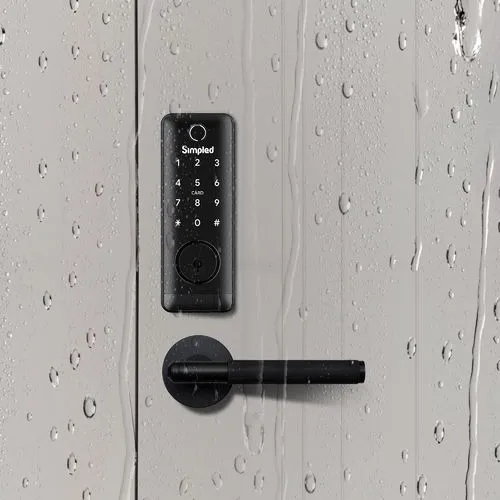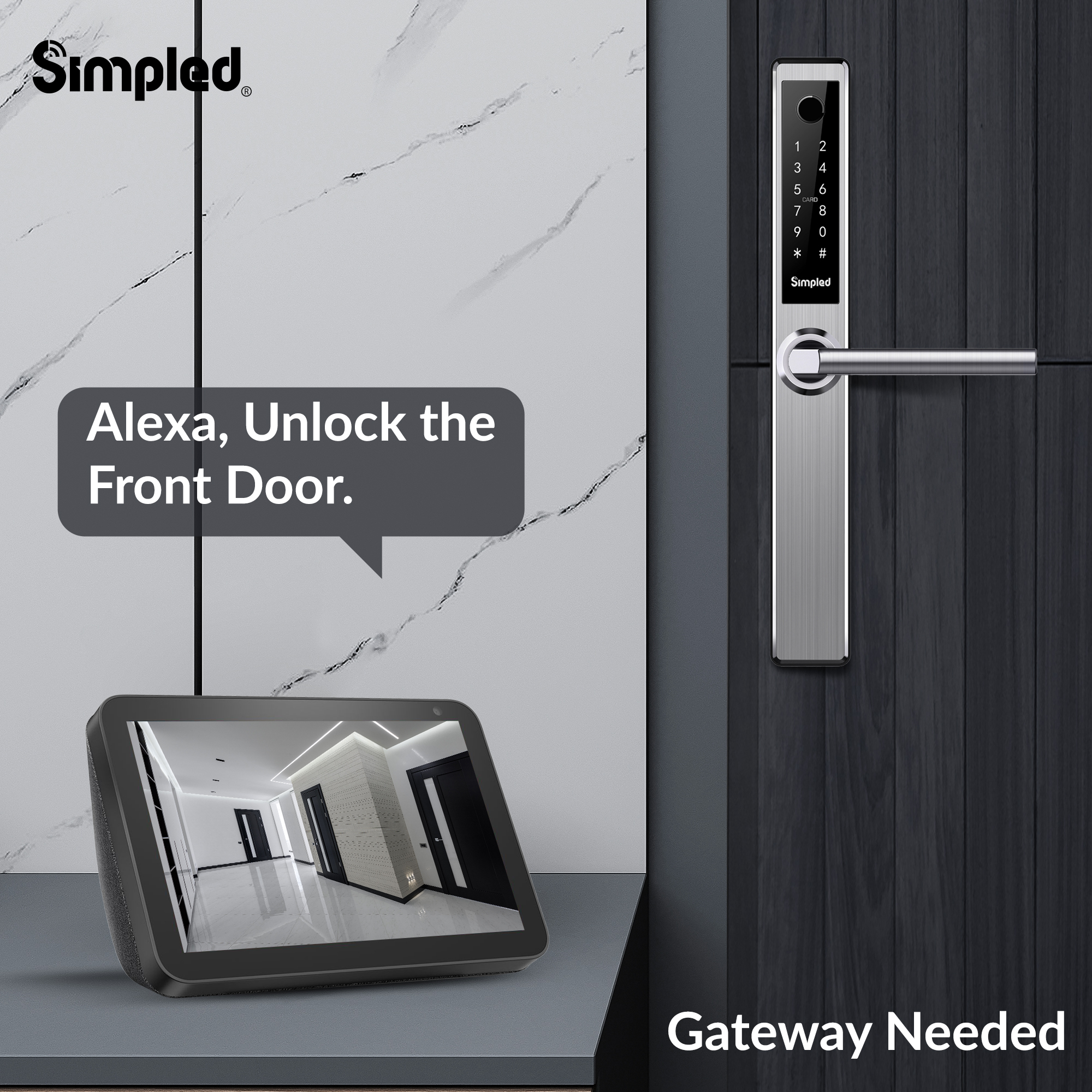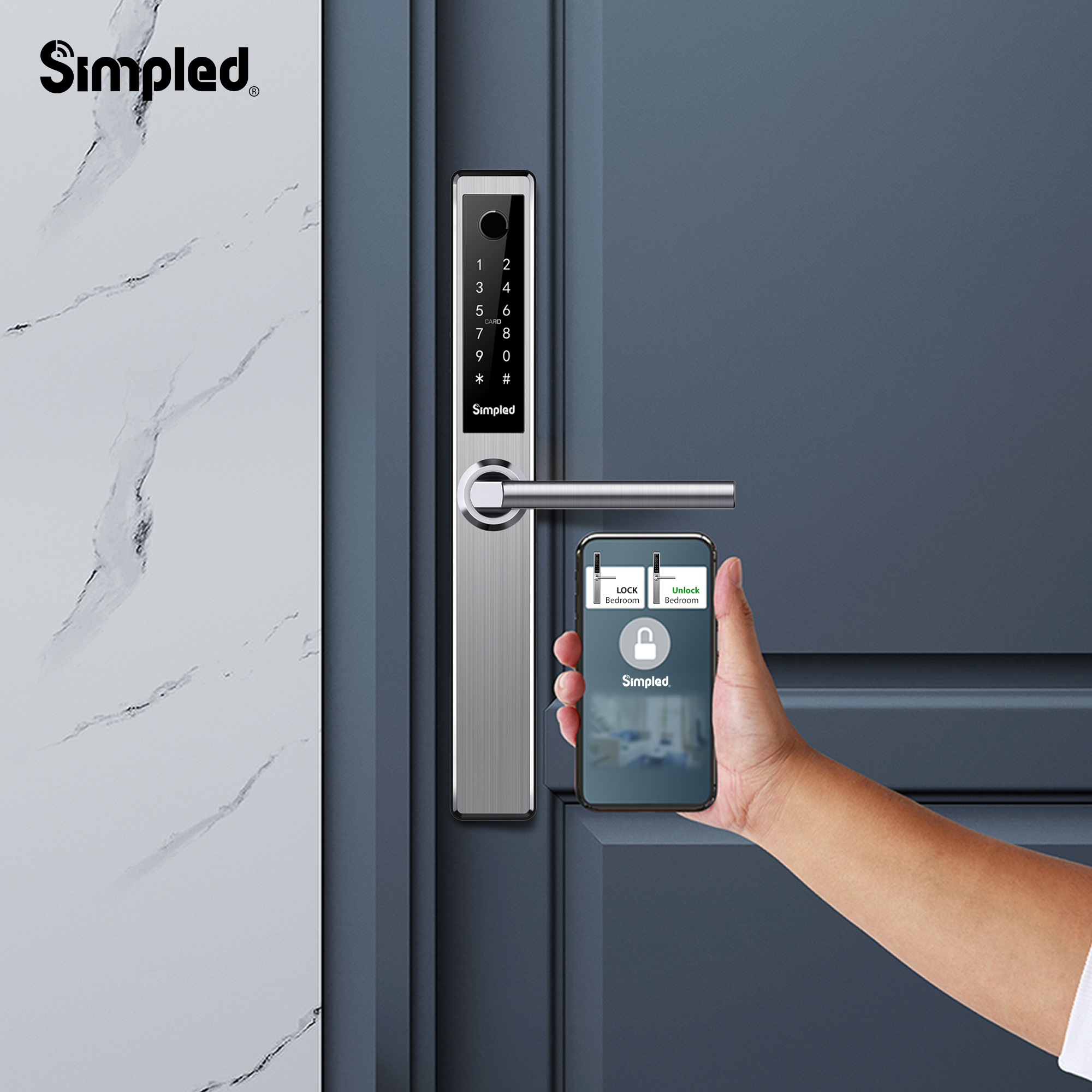Smart Locks The Future of Home Security and Convenience

Homeowners can now enjoy the convenience of remotely managing access to their homes with the help of modern technology - smart locks.
These locks use wireless communication and advanced encryption algorithms to provide a secure and convenient way of locking and unlocking doors.
The history of smart lock technology can be traced back to the early 2000s when companies began developing electronic locks that could be controlled using a mobile device or computer. Since then, smart locks have evolved significantly, with many models offering features such as voice control, biometric authentication, and real-time notifications.
One of the main benefits of using smart locks is their convenience. With remote access and user-specific access codes, homeowners can always control who has access to their homes. Additionally, many smart locks offer automatic locking and unlocking features, eliminating the need for physical keys.
Smart locks also provide an extra layer of security compared to traditional keyed entry systems. With advanced encryption algorithms and tamper detection features, they are much more difficult to bypass than traditional locks.
In this article, we will explore the benefits of using smart locks for home security and convenience in more detail. We will also discuss topics such as the installation process for smart locks, cost comparison between traditional keyed entry systems and smart locks, frequently asked questions about smart locks, and more. By the end of this article, readers will have a comprehensive understanding of why smart locks are an excellent choice for enhancing home security and convenience.
Keyless Entry Options with Smart Locks
Smart locks offer a range of keyless entry options for homeowners, including smartphone apps and voice commands. These options give homeowners greater convenience and control over who has access to their homes.
With smartphone apps, homeowners can remotely lock and unlock their doors from anywhere, eliminating the need for physical keys. They can also set up user-specific access codes and receive real-time notifications when someone enters or exits their home.
Voice commands are another keyless entry option available with smart locks. With voice recognition technology, homeowners can lock and unlock their doors using simple voice commands, providing hands-free convenience.
One of the main advantages of keyless entry over traditional lock systems is the added security it provides. With advanced encryption algorithms and tamper detection features, smart locks are much more difficult to bypass than traditional locks.
Users can manage access to their homes through these keyless entry options by setting up user-specific access codes or granting temporary access to family members or service providers. This allows homeowners to control who has access to their homes at all times.
Overall, keyless entry options offered by smart locks provide homeowners with greater ease and convenience in securing their homes. With remote access and user-specific access codes, they offer an extra layer of security compared to traditional keyed entry systems.
Enhanced Control Over Home Security with Smart Locks

Smart locks provide homeowners with greater control over who enters their homes. One of the ways this is achieved is through temporary access codes. These codes can be created for family members, friends, or service providers who need to enter the home temporarily. This feature allows homeowners to grant access to their homes without giving out physical keys.
Temporary access codes can be created and revoked as needed, providing an added layer of security. Homeowners can create a code for a service provider to enter their home while they are away and then revoke the code once the service has been completed. This eliminates the need for homeowners to give out physical keys or worry about lost keys.
Compared to traditional keyed entry systems, temporary access codes offer greater control over who has access to the home at all times. With traditional keys, homeowners cannot know who has a copy of their key or when it was last used. With temporary access codes, they can always monitor who enters and exits their home.
Overall, smart locks provide homeowners with enhanced control over their home security. Features such as temporary access codes offer greater convenience and security compared to traditional keyed entry systems.
Additional Security Features Offered by Smart Locks
Smart locks offer a range of additional security features that provide an extra layer of protection to homes. One such feature is built-in cameras, which allow homeowners to monitor their homes remotely. These cameras can be accessed through a smartphone app, providing real-time video footage of the home's interior and exterior.
Motion sensors are another common feature found in smart locks. These sensors detect movement near the door and trigger an alarm or notification if someone approaches the door without authorization. This feature provides an added layer of security by alerting homeowners to potential intruders.
Some smart lock models also offer autolocking and unlocking based on proximity sensors. These sensors detect when the homeowner is approaching the door and automatically unlock it, eliminating the need for physical keys or access codes.
Custom alerts are another feature offered by some smart lock models. Homeowners can set up alerts to notify them when someone enters the property using a unique code. This allows them to monitor who has access to their home at all times.
Overall, these additional security features offered by smart locks provide homeowners with greater peace of mind and enhanced security for their homes. By combining keyless entry options with advanced security features such as cameras, motion sensors, and alarms, smart locks offer a comprehensive solution for home security.
Integration Capabilities with Other Devices & Platforms
Smart locks offer integration capabilities with other devices and platforms, making them a versatile addition to any home security system. These integrations allow homeowners to control their smart locks alongside other devices, such as security systems, lighting controls, and more.
One of the most popular third-party platforms for smart lock integrations is IFTTT (If This Then That). IFTTT allows users to create custom automation between different devices in their homes. For example, homeowners can set up an automation that automatically unlocks their smart lock when they arrive home and turns on the lights in their entryway.
Integrating different technologies together provides several benefits. By combining smart locks with other devices, such as security cameras or motion sensors, homeowners can create a comprehensive home security system that offers greater protection against intruders. They can also set up custom alerts and notifications that keep them informed about what's happening in their homes at all times.
Overall, integrating smart locks with other devices and platforms provides homeowners with greater control over their home's security. By combining keyless entry options with advanced security features and automation capabilities, smart locks offer a comprehensive solution for home security that can be customized to meet individual needs.
Remote Access Capabilities Provided by Smart Locks

Smart locks offer homeowners the convenience of remote access capabilities. With an internet connection, homeowners can lock and unlock their doors from anywhere in the world using a smartphone app or other device. This feature provides peace of mind when away from home, knowing that their homes are secure.
Remote access capabilities also eliminate the need for physical keys, providing added convenience to homeowners. They no longer need to worry about losing their keys or carrying them around with them at all times.
In addition, some smart lock models offer additional features such as autolocking and unlocking based on proximity sensors. These sensors detect when the homeowner is approaching the door and automatically unlock it, eliminating the need for physical keys or access codes.
Overall, remote access capabilities provided by smart locks offer greater convenience and peace of mind to homeowners. By combining keyless entry options with advanced security features and automation capabilities, smart locks offer a comprehensive solution for home security that can be customized to meet individual needs.
Installation Process & User Friendliness
Smart locks are designed to be user-friendly and easy to install without professional help. Homeowners can easily install them by following the manufacturer's instructions, which usually involve removing the existing deadbolt and replacing it with a smart lock.
Once installed, smart locks can be programmed to lock automatically at a certain time every day, ensuring the home is always secure. This feature provides added convenience for homeowners who don't want to worry about manually locking their doors every time they leave the house.
Another benefit of smart locks is their compatibility with multiple users. Family members can each have their own unique code for easy access, eliminating the need for physical keys. This feature also allows homeowners to monitor who has access to their home at all times, providing greater peace of mind.
Overall, smart locks offer ease of use and user-friendliness that make them a convenient addition to any home security system. With automatic locking and unlocking features, multiple user codes, and easy installation, homeowners can enjoy enhanced security without sacrificing convenience.
Compatibility with Virtual Assistants
Smart locks have become increasingly compatible with virtual assistants like Amazon Alexa and Google Assistant. This compatibility allows homeowners to control their smart locks using voice commands, adding a layer of convenience to daily life.
By integrating smart locks with virtual assistants, homeowners can use voice commands to lock and unlock their doors, check the status of their locks, and even set up custom automation. This feature adds convenience to daily life by eliminating the need for physical keys or access codes.
Voice control through virtual assistants also provides added benefits for individuals with mobility issues or disabilities. They can easily control their smart locks using voice commands, eliminating the need for physical movement.
Overall, compatibility with virtual assistants makes smart locks more user-friendly and convenient. By combining keyless entry options with advanced security features and automation capabilities, smart locks offer a comprehensive solution for home security that can be customized to meet individual needs.
Accessibility Features Offered by Smart Locks
Smart locks offer accessibility features that make it easier for people with disabilities or mobility issues to enter and exit their homes without assistance from others. Keyless entry options eliminate the need for physical keys, providing added convenience for individuals with difficulty manipulating small objects.
Additionally, smart locks can be programmed with temporary access codes that can be shared with caregivers or family members to provide easy access when needed. This feature eliminates the need for physical keys, which can be easily lost or misplaced.
Compared to traditional keys, temporary access codes offer greater accessibility and convenience. They can be easily shared with caregivers or family members, eliminating the need for physical keys and providing greater peace of mind.
Overall, the ease of use and accessibility features offered by smart locks make them a convenient addition to any home security system. By combining keyless entry options with advanced security features and automation capabilities, smart locks offer a comprehensive solution for home security that can be customized to meet individual needs.
Weather Resistance & Durability of Smart Locks
Smart locks are designed to withstand harsh outdoor conditions like rain, snow, and extreme temperatures. Most models are weather-resistant and can withstand the elements, providing peace of mind for homeowners who want to ensure their homes are secure in any weather condition.
The durability of smart locks is comparable to traditional lock systems, if not better. Smart locks are made with high-quality materials that can withstand wear and tear over time. They also come with advanced security features that make them more difficult to tamper with than traditional lock systems.
In addition to their durability, smart locks offer peace of mind knowing that the device will last long-term. They require little maintenance and can be easily updated with new software or firmware.
Overall, smart locks offer a durable and reliable solution for home security. With their advanced security features and weather-resistant design, homeowners can rest assured that their homes are protected from intruders and the elements alike.
Cost Comparison Between Traditional Lock Systems vs Smart Locks
When comparing traditional lock systems to smart locks, the cost difference can vary depending on the specific models and features. However, in general, smart locks tend to be more expensive than traditional lock systems.
The benefits of smart locks over time in terms of security measures make them a worthwhile investment. With advanced security features such as keyless entry options, temporary access codes, and remote monitoring capabilities, homeowners can enjoy greater peace of mind knowing their homes are protected from intruders.
In addition to the security benefits, smart locks can save homeowners money in the long run by eliminating the need for physical keys, which require costly replacements over time. Smart locks offer greater convenience and accessibility with keyless entry options and temporary access codes. These features eliminate the need for physical keys that can be easily lost or misplaced.
Overall, while smart locks may have a higher upfront cost than traditional lock systems, they offer greater security measures and long-term savings that make them a worthwhile investment for homeowners looking to enhance their home security systems.
Final Thoughts The Future Potential of Smart Lock Technology
Smart lock technology has come a long way in recent years, offering homeowners advanced security features, greater convenience, and accessibility. With keyless entry options, temporary access codes, and remote monitoring capabilities, smart locks provide a comprehensive solution for home security that can be customized to meet individual needs.
The future potential of smart lock technology is promising. Advancements in biometric authentication could allow for even more secure home access, while integration with other smart home devices could offer increased automation and control.
Investing in a smart lock system is worth considering for homeowners looking to enhance their security. While the initial cost may be higher than traditional lock systems, the long-term benefits in terms of security measures and cost savings make it a worthwhile investment.
As technology advances, smart lock systems will continue to evolve and improve. Homeowners can look forward to even more advanced security features and greater convenience in the future.
